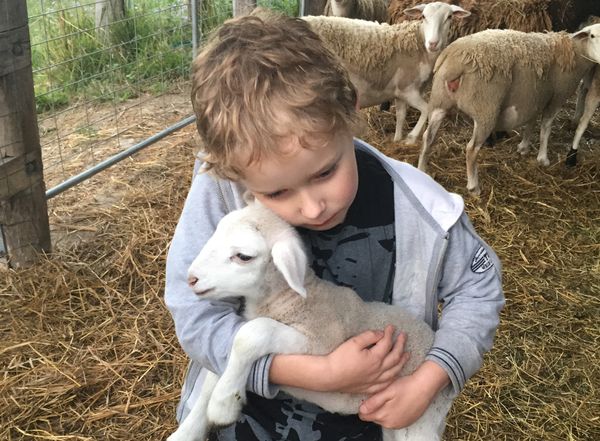Good Shepherding
By Rev. Andy Fleming, Chaplain
The picture above is one taken several years ago of my youngest son visiting a farm. I love this picture, not just because it’s cute, but because it is a picture of care, particularly for something that is vulnerable. In an age where society is becoming more and more individualistic, caring for those who are vulnerable has taken on a greater significance, as the awareness of who is vulnerable has increased. My son holding the lamb draws thoughts about Jesus declaring himself to be the Good Shepherd.
There are two schools of thought about the concept of shepherding from the ancient world. Firstly, in the time of David, a king would be understood to be a shepherd of their people. It was the responsibility of kings to provide and protect the people within their kingdom, but of course, power and greed as well as their own sense of importance – all the human traits that cause leaders to fail – were just as present then as they are now.
Secondly, the ancient world understood that sheep were the most vulnerable of animals. So, the metaphor for sheep and shepherding could be easily understood by the people living in the subsistence culture of the time. Sheep need a leader to follow to the green pastures and the still waters. Sheep need a leader to protect them from predators, both animal and human.
Where earthly kings fail, Jesus does what a shepherd is supposed to do. In the Gospel of John, Jesus declares, “I am the good shepherd.” The imagery of Jesus as the good shepherd is an image that many of us have come across. As members of the community of Jesus’ followers, we identify as members of the flock. This image offers reassurance when we face hardships, and our troubles feel insurmountable. Despite living in a comfortable and safe place like Australia, it is possible that we can be made vulnerable at any time.
The writer of 1 John sums up for us how we too can be good shepherds to those around us. There is no talking about what should be done, where you might say “I’m thinking of you” and offer platitudes that are supposed to lift the spirits of someone in need. Rather, it is a clear directive: "let’s not talk about love; let’s practice real love" (1 John 3:18). Real love is grounded in action and truth. The action of love is borne out of Jesus’ love for us and shows those being helped to know they belong and are part of God’s people, just as we know, through Jesus’ good shepherding of us, that we belong to God.
Go in peace,
Rev. Andy
